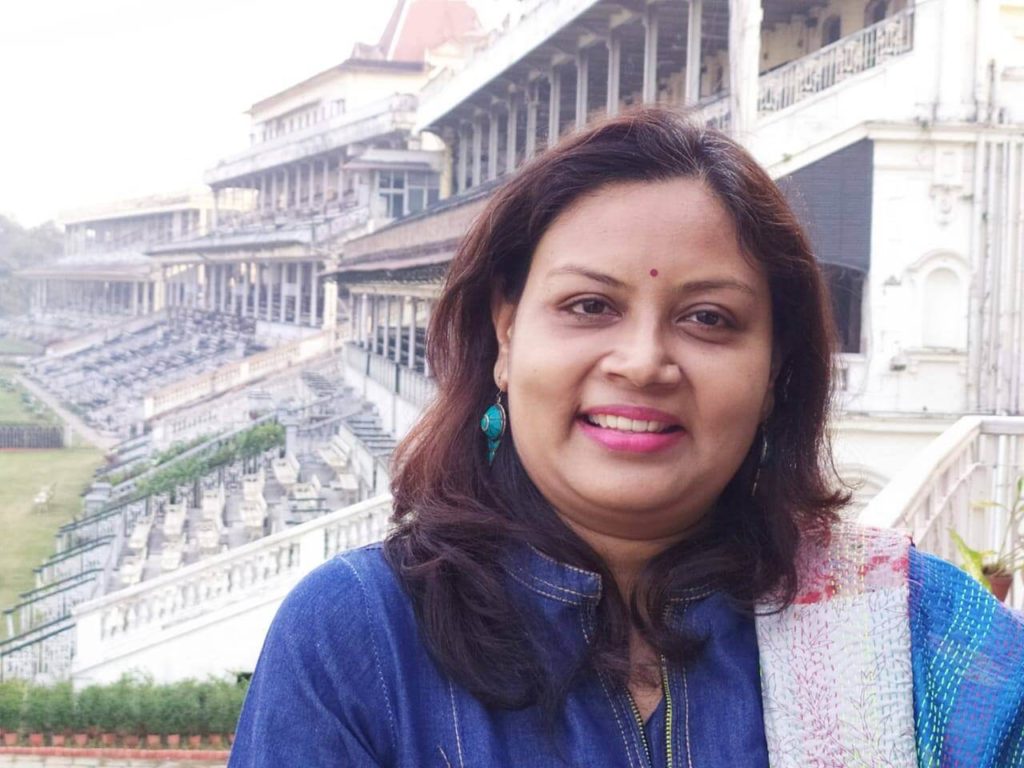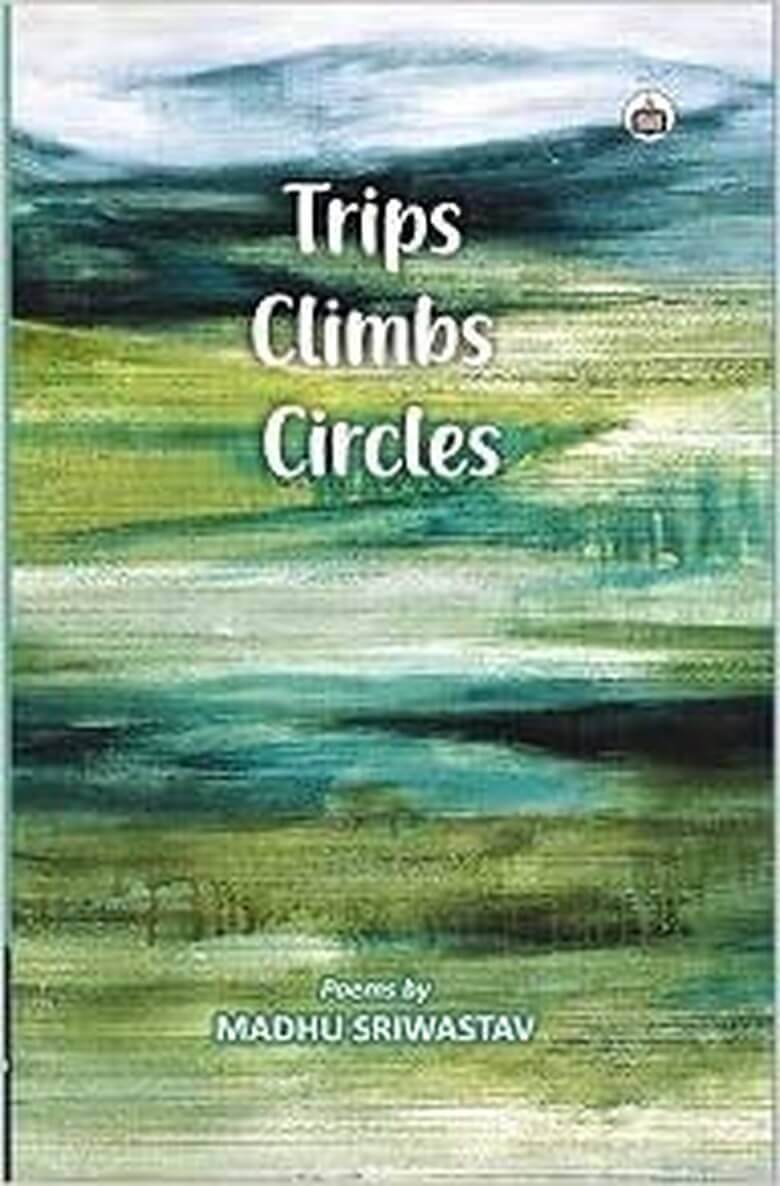Reading Time: 4 minutes
Nabanita reviews Trips Climbs Circles, an anthology of sixty poems, by Madhu Sriwastav. An exclusive for Different Truths.
Genre: Poetry
Poet: Madhu Sriwastav
Pages: 90
Meena Alexander once wrote, “The act of writing, it seems to me, makes up a shelter, allows space to what would otherwise be hidden, crossed out, mutilated.” The poet is always in search of such a space, a space that would allow her to express what otherwise appears to be inexpressible or incommunicable. What, if not poetry, can be the medium to express our deepest concerns?
In this anthology of sixty poems, the poet creates her own space of expression…
These thoughts crossed my mind as I was reading Madhu Sriwastav’s debut collection of poetry Trips Climbs Circles. In this anthology of sixty poems, the poet creates her own space of expression, weaving words to communicate her negotiation with the world. Arranged alphabetically, the poems speak of diverse issues.
Blind Man’s Buff
Moving from one poem to another in this anthology is an experience similar to playing the blind man’s buff. In it a blindfolded player is unaware of who she will catch next. But each ‘catch’ gives a sense of fulfilment, a move towards the closure of the game. The arrangement of Madhu’s poems too takes the readers through a similar situation where one does not know what to expect next.
… each poem adds to the readers’ understanding and enjoyment, engaging with them at multiple levels.
But each poem adds to the readers’ understanding and enjoyment, engaging with them at multiple levels. The readers, along with the poet, hop and skip from an ‘Orderly Universe’ to ‘OT’ to ‘Pebble’ and so on.
One of the striking features of Madhu’s poems is an inherent rhythm. Though contemporary poetry tilts towards free verse, here we find several poems following a loose rhyming pattern. The structure is not too close and therefore the rhyming does not appear to be forced.
The rhythmic quality of the poems adds a pace…
The rhythmic quality of the poems adds a pace to these pieces and makes them more suitable for reading aloud. Short, crisp lines add to the lyricism of the poems. A few lines from the first poem in the anthology goes as follows:
A usual day… Am set for all All of a sudden I get your call! A gush of joy A blush of pink My spirits soar Am joyous within!
Experiments with Styles
But the poet does not stick to just one style of writing. She experiments with various modes and they add to the readers’ experience of the poems. In ‘Let me be’ the poet voices her anguished exasperation with the world which constantly expects an individual to shape oneself in the set pattern of conventions. The exasperation is brought out through words as well as multiple exclamation marks and dots in a few lines –
Change, change, change!!! Stop, stop, stop!!!!!!!!!!!!!! Pull, pull, pull… Push, push, push…
These lines with their repetitive words and unusual punctuation convey the frustration…
These lines with their repetitive words and unusual punctuation convey the frustration that the poet feels with such demands of the world. The poet successfully represents the heightened sense of immediacy along with complete disapproval of such social expectations and draws the readers into a similar intensity of feelings.

Ecocritical Concerns
In another poem, ‘Daunted Rain’, the poet experiments with dialogue form, presenting us a conversation between ‘Droplets’ and ‘clouds’. The poem engages sensitively with the ecocritical concerns of urban society. By assigning voices to the droplet and cloud, the poet dramatises the situation, drawing readers’ attention to a matter which is of primary global concern.
Similar ecological concerns are expressed in the poem ‘Dreary Land’ as well. In the lines:
Live wires around trees… Trees bear the shock in grace, Like a woman juggling chores Home, office and more!
The lack of agency binds together both the ‘tree’ and the ‘woman’ in a similar state of victimisation…
The lack of agency binds together both the ‘tree’ and the ‘woman’ in a similar state of victimisation due to greed and power that is located within the fabric of contemporary society. But the poem ends in a note of hopeful resilience ‘Yet the tiny sapling wakes’, reinstating faith in the regenerative and restorative nature of both the tree and the woman.
Freedom Movement
In two other poems ‘Desh’ and ‘Gandhi’, the poet poignantly speaks of the episodes of the Indian freedom movement and juxtaposes it with the contemporary situation of our country. ‘Desh’ speaks of the agonising episode of Jallianwalla Bagh and compares General Dyer’s brutality with that of contemporary violence against the innocent. The poem reminds us of how the Indians in the British army were the ones to shoot at their innocent and defenceless countrymen and how even now, the “innocent, unarmed, helpless souls/ are raped, lynched, shot/ by our own”.
A similar parallel is drawn in the poem ‘Gandhi’ as well where the poet reminds how the spirit of Gandhi ‘irks’ not just the foreigners but also his countrymen.
A similar parallel is drawn in the poem ‘Gandhi’ as well where the poet reminds how the spirit of Gandhi ‘irks’ not just the foreigners but also his countrymen. The poems poignantly bring out the ineptitude and apathy that marks contemporary powers that be.
Complex Responsibilities
In a perceptive Foreword written by Sanjukta Dasgupta, former Dean, and Professor, and herself a reputed poet, she mentions the complex responsibilities of the Indian poets writing in English who need to negotiate the dual challenge of “representation of the idea of India or Indianness in the poem” and “skillful appropriation of the English language.”
Madhu Sriwastav’s choice of subjects and mode of rendering does justice…
Madhu Sriwastav’s choice of subjects and mode of rendering does justice to both of these requirements. The longest poem in the anthology, ‘The Scorned Bride’ is rooted in the Indian epic, Mahabharata, and yet brings out the angst of a rejected bride, the anger that she spews against the world that cares nothing for the woman’s wishes.
The poems in this anthology are versatile…
The poems in this anthology are versatile, each brings out a perspective reflecting deep engagement with life. The poet voices her angst, hope, happiness, concerns, and protest as she trips and climbs through the world, as she circles in her orbit of sensitive musings.
Visuals sourced by the reviewer















